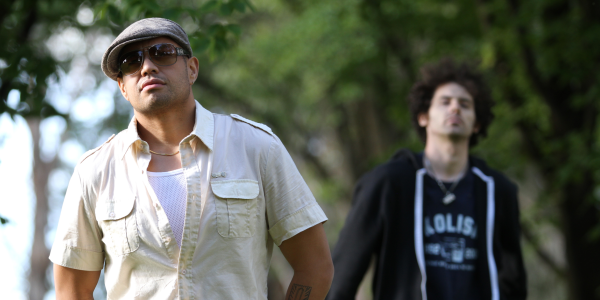Billy Corgan, it goes without saying, is regarded as something of an oddball. Similar to the saga that is The Life And Times of Axl Rose, Corgan’s life, his exploits, relationships and controlling personality, have burgeoned to such mythic proportions that the zeppelin of his persona almost overshadows his legacy.
Similar to the saga that is The Life And Times of Axl Rose, Corgan’s life, his exploits, relationships and controlling personality, have burgeoned to such mythic proportions that the Zeppelin of his persona almost overshadows his legacy. That blimp’s mooring, from which 1993’s smash hit Siamese Dream launched, rocketed Corgan and his fellow Smashing Pumpkins – D’arcy Wretzky, Jimmy Chamberlin and James Iha – into a universe they had scarcely dreamt of.
How to summarise the ensuing seventeen years? Commercial and critical acclaim, heroin overdoses, in-band deceptions, breakups, reunions, lineup changes, solo careers, public romances and spats with Courtney Love, Twitter rants, collaborations with renowned bubble-head Jessica Simpson: all contributed to the recasting of Corgan from mysterious, uber dilettante (and self-proclaimed genius) to a human as weird and damaged as the rest of us. Once we’ve seen the machinations cloaking the Wizard of Oz, how does the unmasked Oz proceed?
First, Billy admits his image is his own fault. Discussing those aforementioned Twitter rants he muses, “The more you strip away the mystique… it actually works counterintuitive to why people like rock music. People like rock music because they don’t understand, not because they do understand,” he laughs. “And when you make too much understanding it actually kills why they listen to you.”
Second, Billy decides that while his career trajectory will never again reach the dizzying heights of grunge-era Smashing Pumpkins, damn it, he is The Smashing Pumpkins. He announces – despite being the only remaining original member – they’re Back (capital B). Hello Axl. Bloggers dismiss him as irrelevant. Long term fans groan and wonder. Corgan continues.
As Billy has expounded in Mixdown last week, 2010’s Smashing Pumpkins have bonded “as a unit”. His trust shattered to smithereens in original Pumpkins days, Billy can barely believe that his new band – guitarist Jeff Schroeder (The Lassie Foundation), bassist Nicole Fiorentina (Veruca Salt, Spinnerette) and drummer Mike Byrne (who secured the stool aged only 19, trouncing thousands in auditions) – are actually there to make music. Claiming that past ‘Pumpkins offered ideas then demanded royalties years later, Billy is now relaxed, saying of his offsiders: “If they gave me an idea, and I used it, I would credit them… but nobody’s trying to sneak in the side door. They’re super-supportive of what we’re trying to do, musically. It’s a really happy, healthy situation for me.
“Honestly — and I say this with complete candor — I’m shocked that at forty-three I’m in a happy band.”
Suggesting the ‘new’ Smashing Pumpkins sound retains massive choruses while flirting with electronica, Corgan has decided they’ll record forty-four songs, released individually under the collective (oddly spelt) title Teargarden By Kaleidyscope. The seventh, The Fellowship, is due for release now. Billy is recognising a trend and meeting it on its turf. Why, he asks, would he waste energy on songs that won’t make it onto a listeners chosen playlist? Kids today don’t give a fuck about albums.
“They might get Siamese Dream and go, ‘Okay, I like Today, I like Disarm, I like Cherub Rock,’ then the other eight are left in the can,” Billy muses. “So, there’s a big shift in listening patterns; it [only] rewards the popular end of your music. It makes it more difficult to be an artistic band that works in the pop world.” He believes the release concept allows each song its moment, stating, “It’s been effective.”
It’s easy to get the strong impression that Billy’s purported “control freak” streak is borne of money – or more pointedly, having come from none and being concerned about ending up with none. Having bet everything on himself, Billy seemingly must ensure he doesn’t lose. While a younger man might throw caution to the wind, the currently unsigned Corgan must understand exactly what sort of business he’s running. Releasing music online is one thing; complimentary media is a quandary under consideration. “You can do a lot of fun, creative things and waste a whole lot of money… but if it endangers your business and has you making choices that are not artistically motivated, that’s really difficult,” he admits.
“My primary focus is, ‘How can I run a business that allows me to do what I want to do, the way that I want to do it?’ Unfortunately, with a lot of media – websites, videos – I’m not seeing, in the culture, where you’re necessarily getting return on investment.”
We both take a breath. I hear the trapdoor finally slam shut on my teenage years. As superstar and kid on different sides of Siamese Dream become two adults working in an industry he adds, “That doesn’t mean I’ve given up, I’m just trying to figure out a new way to approach it.”
Billy seems more willing than some of his era-mates to consider ways to attract the younger generation and their entertainment dollar. “Well,” he says evenly, “[Smashing Pumpkins were] always trying to push the envelope of expectation.” He has no issue with operating under The Smashing Pumpkins’ moniker; turning forty made “cashing his cheques” an easier decision. What Billy doesn’t warrant is “reunion tours” where bands play their best-selling album in its entirety.
He highlights Pavement: “They’re stuck in a different business model from the one they grew up in; they don’t know what else to do. I’ve found myself in a really beautiful, integral position: I’m not mad at anybody, I’m not pointing fingers, I’m just doing what I want to do and it’s there if you wanna engage in it.
“That’s been much more successful for me on every level.”







